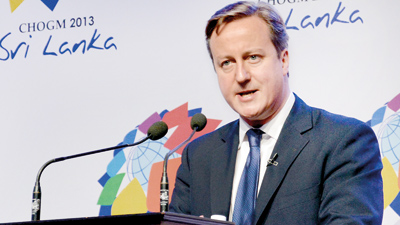News
Inquire into alleged war crimes or face UNHRC inquiry, British Premier warns Lanka
British Prime Minister David Cameron issued a tough message to Sri Lanka yesterday, warning it has time till March next year to set up an independent inquiry into alleged war crimes committed during the last phase of the war in 2009, or face a possible international inquiry through the United National Human Rights Commission (UNHRC).
“Let me make it very clear that if that investigation is not completed by March, then I am going to use our position on the UNHRC to work with its Commissioner to call for a full, credible and independent international inquiry,” Prime Minister Cameron told reporters hours after he had conveyed his message to President Mahinda Rajapaksa. The two met on Friday night.

Cameron: Talking tough. Pic by Indika Handuwala
“It is important to have an inquiry into what happened, particularly at the end of the war, as highlighted in the film ‘No Fire Zone’. It’s important to give them (the Sri Lanka Government) time to set up that independent inquiry, but if they don’t set that up by March, I will fully back an international inquiry,” he said.The British Prime Minister defended his decision to come to Colombo to attend the Commonwealth Heads of Government Meeting (CHOGM), despite calls for him to boycott it, saying his trip has helped “to shine the global spotlight on the situation here in Sri Lanka.”
Prime Minister Cameron, who is the first foreign head of State or government to travel to the North since independence, also had words of praise for the country. “It’s an extraordinary country, it has enormous potential, you can really feel that when you are here. It has suffered an appalling civil war, and it has suffered again from the tsunami. I am hugely optimistic about the country’s future,” he said.
Prime Minister Cameron also said, no one here wants to return to the days of the Tamil Tigers and the dreadful and horrible things that they did, and acknowledged that reconciliation is a long drawn out process.” We should show proper respect for the fact that this country suffered three decades of bloody conflict. Recovery and reconciliation don’t take place in a few months, or even in a few years,” he said.
However, he said, it is very important that issues such as freedom and human rights are not ignored. “Their own reconciliation commission has done some good work, but this is not an issue that is going to go away. This s is an issue now of international concern.”
Prime Minister Cameron said he had a frank discussion with President Rajapaksa, and urged him to seize the opportunities presented after the end of the war, to work in partnership with newly elected Chief Minister of the Northern Province, ensure freedom for the media, and hold a credible, transparent and independent investigations into alleged war crimes
“We had a very frank exchange of views. We have met many times before and have a good relationship,” he said.
Prime Minister Cameron said both sides had very strong views expressed and not every thing he said was accepted. “I said this as head of one sovereign country to another.”He also announced that, as part of a support for reconciliation efforts in the country, the British government will provide Sterling pounds 2.5 million to support de-mining in Jaffna, Kilinochchi and Mullaitivu.He also thanked the authorities for facilitating his visit to the north, along with a large number of journalists.”
I was able to take with me respected international journalists from the BBC, ITV, Sky News and Channel 4 to the North. We were able to properly visit the Chief Minister, visit the newspaper which has had so many problems and was attacked over the years, and also visit the village of displaced people and talk to lots of people about their problems,” he said.
Selective Cameron shuts out Lankan journalists at news briefing
One out of eight. That is the number of questions that Sri Lankan journalists were allowed to ask from visiting British Prime Minister David Cameron during a press briefing he held in Colombo yesterday. After making his opening statement, Cameron said he would take a few questions, but one after the other, he called out names of mainly British journalists who he knew by name, while one Sri Lankan journalist was given the opportunity to raise a question, even though many hands were up, looking for a chance to grill the British Prime Minister.
As he left the hall at the end of the briefing, one angry journalist shouted, “You are a hypocrite, Mr Cameron.” Later, when several Government Ministers held a press conference at the same venue, they were asked to comment on Cameron’s decision to limit the number of local journalists allowed to ask questions from him. “You will have to ask that from him,” said Minister Nimal Siripala de Silva, adding that President Mahinda Rajapaksa had been more generous at his press conference, allowing foreign journalists the opportunity to question him.


